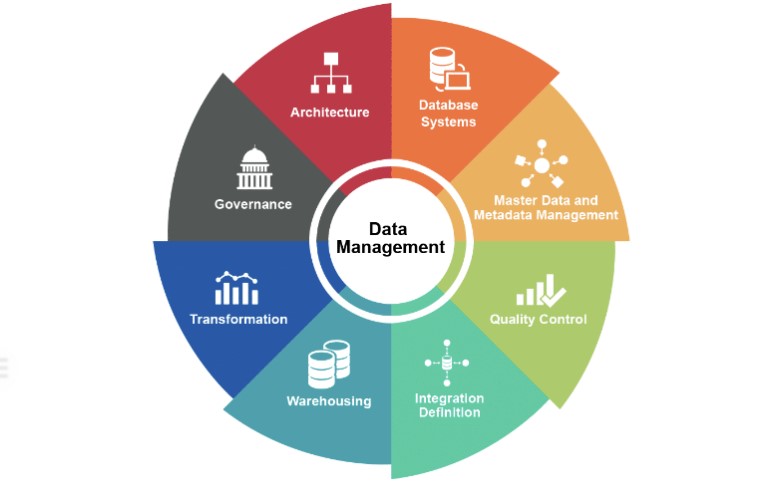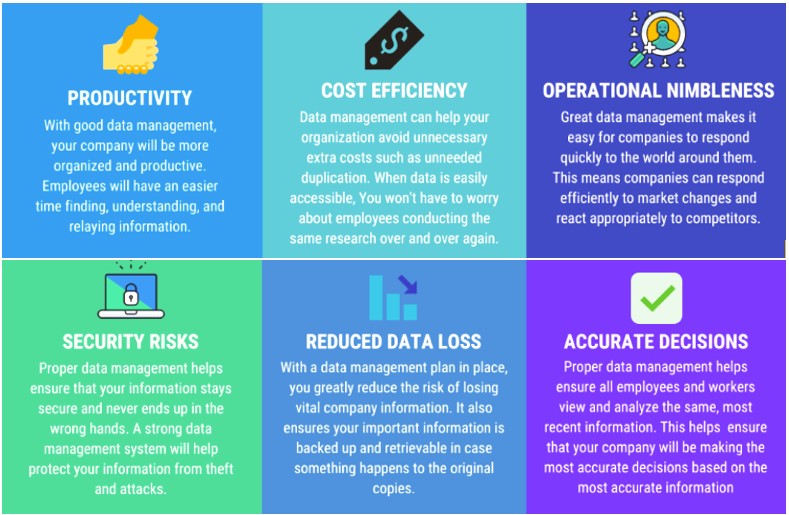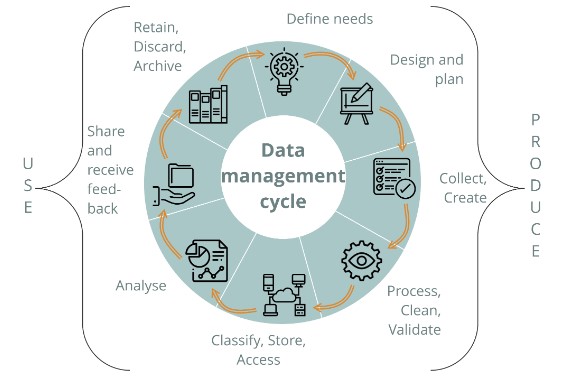Data Management
Growth with Data: Mastering Management for Success
One key aspect of data management is ensuring data integrity, which involves maintaining the accuracy, consistency, and reliability of data throughout its lifecycle. This includes implementing measures to prevent data loss, corruption, or unauthorized access.
It also involves data integration, combining data from different sources and formats to create a unified view of information. This may include data warehousing, data cleansing, and data transformation processes to ensure compatibility and consistency across disparate datasets.
Effective data management also implicates defining Data Governance
policies, establishing data quality standards, and implementing
appropriate technologies and tools for data storage and processing.
Effective data management is essential for organizations to derive
insights, make informed decisions, and drive business growth in today's
data-driven environment.
What is Data Management?
Data management is the process of collecting, storing, organizing, and maintaining data in a structured and secure manner to ensure its accessibility, reliability, and usability. It encompasses a range of activities including data acquisition, validation, storage, retrieval, and dissemination.
Data Management: Elevating Industries to New Heights
Several industries that benefit most from effective Data Management:
Technology: Technology companies rely heavily on data management for product development, customer insights, and operational efficiency. Data management helps them make informed decisions, improve user experiences, and optimize their services.
Finance: The finance industry utilizes data management for risk management, fraud detection, compliance, and personalized customer services. Efficient data management enables financial institutions to analyze vast amounts of data to make informed investment decisions and mitigate risks.
Healthcare: Data management plays a critical role in healthcare for patient records management, clinical research, disease surveillance, and treatment optimization. Proper data management ensures patient confidentiality, facilitates research advancements, and improves healthcare delivery.
Retail: Retailers leverage data management for inventory management, customer relationship management, personalized marketing, and sales forecasting. By analyzing customer data, retailers can tailor their offerings, optimize pricing strategies, and enhance the overall shopping experience.
Manufacturing: Data management helps manufacturers optimize production processes, manage supply chains, and improve product quality. By collecting and analyzing data from various sources, manufacturers can identify inefficiencies, reduce downtime, and enhance productivity.
Telecommunications: Telecommunication companies rely on data management for network optimization, customer billing, and service delivery. Effective data management enables telecom providers to analyze network performance, detect potential issues, and deliver better services to their customers.
Energy and Utilities: The energy and utilities sector utilizes data management for resource optimization, predictive maintenance, and grid management. By collecting and analyzing data from sensors and meters, energy companies can improve efficiency, reduce costs, and ensure reliable service delivery.
Transportation and Logistics: Data management is crucial for optimizing transportation routes, tracking shipments, and managing logistics operations. Transportation companies use data management to improve fleet efficiency, reduce fuel consumption, and enhance customer satisfaction.
Data management is a foundational aspect of modern businesses across various industries, enabling them to unlock insights, drive innovation, and gain a competitive edge in today's data-driven economy.

Why is Data Management Important?

Data Management Cycle
Data analysis is the process of applying techniques to data to discover useful information and support decision-making. After data collection, each separate piece of data can be brought together into a dataset and database, and through data analysis techniques they can provide more useful information. The information that is discovered through data analysis can then be used to facilitate decision-making.
The data management cycle describes all the specific steps required for effective information management. As such, the data management cycle outlines the different processes required to produce and use data, thereby facilitating effective evidence-based decision-making in humanitarian and development activities.

Well-executed analysis based on high quality data is key to the entire cycle. However, it is important to note that data analysis is one component of a larger cycle to enable data-driven decision making in the humanitarian and development sectors, as seen in the diagram above.
This toolbox is focusing primarily on data analysis, while also providing guidance on adjacent tasks in the data management cycle.
Benefits of Data Management
Improved Decision-Making: By providing access to accurate, timely, and relevant data, data management enables informed decision-making at all levels of the organization.
Enhanced Efficiency and Productivity: Streamlining data processes and ensuring data quality reduces manual effort, minimizes errors, and increases productivity.
Cost Reduction: Efficient data management practices help minimize storage costs, optimize resource utilization, and prevent unnecessary expenses associated with data redundancy and inefficiency.
Better Customer Insights: Analyzing customer data enables organizations to understand customer behavior, preferences, and trends, facilitating targeted marketing campaigns and personalized customer experiences.
Compliance and Risk Management: Implementing robust data management practices ensures compliance with regulatory requirements, mitigates risks associated with data breaches or loss, and enhances data security and privacy
Data-driven Innovation: Access to comprehensive, well-managed data fuels innovation by enabling the development of new products, services, and business models based on insights derived from data analysis.
Improved Operational Performance: Optimizing data processes and workflows enhances operational efficiency, reduces downtime, and enables organizations to respond more effectively to market changes and customer demands.
Competitive Advantage: Organizations that effectively manage their data gain a competitive edge by leveraging data-driven insights to anticipate market trends, identify opportunities, and adapt their strategies accordingly.
Data Collaboration and Sharing: Centralized data management platforms facilitate collaboration and data sharing across departments and teams, promoting cross-functional alignment and fostering innovation.
Long-term Sustainability: Establishing a solid foundation for data management ensures scalability, agility, and adaptability, positioning organizations for long-term success in an increasingly data-driven world.
It is Never Too Late To Start
Companies should prioritize data management to unlock the full potential of their data assets. Despite seeming complexity, don't hesitate to embark on data optimization. In a digital age, data-driven decisions are key to a bright future. Just take the first step towards data quality improvement; progress will follow.
Explore Our Range of Data Management Solutions to Find Your Ideal Match
Reach out to our Sales Team
We can’t wait to talk to you about how ServerDirect can empower your teams and organization to achieve their maximum potential.




Schrijf in voor onze Nieuwsbrief
Hebt u vragen of hulp nodig? Wij helpen u graag.
